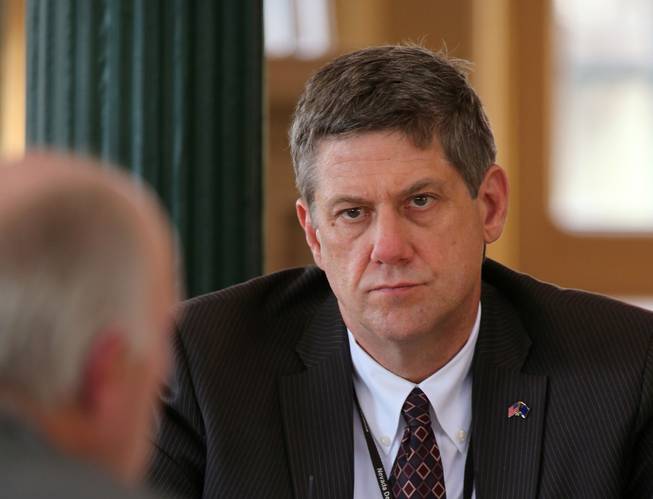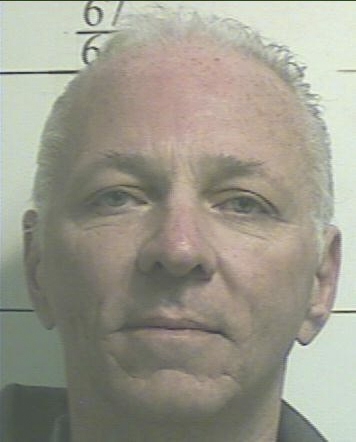
Cathleen Allison / AP
Nevada Department of Corrections Director Greg Cox listens to testimony during a meeting of the Board of State Prison Commissioners at the Capitol in Carson City, Nev., on Tuesday, March 19, 2013.
Monday, Dec. 16, 2013 | 2 a.m.
Related stories
More than two months after prison inmate Richard Ferst’s corpse was discovered inside a cell at the Northern Nevada Correctional Center, it remains unexamined inside a cold chamber at a funeral home in Carson City.
Ferst’s mother, Sandy Morningstar of Las Vegas, hopes preserving the body will help reveal how her son died — something prison officials haven't explained.
Following her son's wishes, Morningstar wants to scatter Ferst’s ashes into the Pacific Ocean at Newport Beach, Calif., where he grew up. It was Ferst's favorite place.
“Because of their screwing around, my son is still in a refrigerator,” Morningstar said. “It's maddening.”
Ferst is one of four state prison inmates who died in October at the same facility under the care of the Nevada Department of Corrections. Officials never said whether a death investigation was requested in the cases. Three other prisoners have since died at other facilities, and autopsies revealed a cause and manner of death for two of them.
Relatives and civil rights advocates say they have grown increasingly frustrated by the prison system's lack of urgency in determining why some of the men died.
The Nevada Department of Corrections did not request a postmortem examination for Ferst after he died Oct. 5, even though a new state law, effective June 2, requires department officials to do so for any inmate who dies under prison care. The law was openly endorsed earlier this year by prisons director Greg Cox, who did not respond to requests for comment via the department's public information office.
A spokeswoman for Gov. Brian Sandoval's office said the issue was being investigated by the Department of Corrections and the Attorney General's Office. Neither agency addressed requests for comment about the rule's implementation.
Before the law passed, coroners contracted by each prison had the authority to request the procedure only if deemed necessary. Under the new regulation, an autopsy is to be automatic unless a relative objects within three days of the death.
The change brought Nevada's inmate death procedures more in line with that of other states, said Andrew Spivak, a sociology professor at UNLV and former research analyst with the Oklahoma Department of Corrections.
Utah's state-run Medical Examiner's Office, for example, takes custody of anyone who dies while in prison. Similarly, California's county coroners and medical examiners are required to determine a cause and manner of death for anyone who dies in prison or while under a sentence.
Such policies are designed to protect corrections departments from liability, Spivak said.
“As (corrections departments) become much more bureaucratized and much more scrutinized, they implement this type of policy,” Spivak said. “In corrections, one of the things they always want to show is that they have a certain transparency and show that they offer a relatively safe environment.”
Nevada's prison system lacks transparency and must share more information with the public about the death of its inmates, said Tod Story, executive director of the American Civil Liberties Union's Nevada chapter.
"Our concern, specifically, is dealing with the Northern Nevada Correctional Center and the four deaths that occurred in one month at the same facility," Story said. "It raises questions, that being our concern there. We have had other issues at that facility that were brought to us by inmates."
The ACLU plans to launch an investigation into the recent string of deaths, though an information request from the advocacy group sent to NDOC in early November has not been acknowledged.
Prison officials have previously refused to discuss with the Sun the circumstances of four October deaths. The Nevada Attorney General's Office said the Department of Corrections only would provide basic information via press release.
“It's unfortunately too typical,” Story said. “It's literally dragging of feet, or a process in which they would rather not provide the information. It would be the department's responsibility to explain why their response rate is so slow.”
The ACLU asked for information about Ferst and three other inmates who died in October:
• Convicted cop-killer Larry Peck, 62, who died Oct. 4.
• Joseph Oxford-McArthur, 31, who was serving a one- to three-year sentence for domestic battery and was found unconscious Oct. 21 inside his cell before dying four days later at an area hospital.
• An unidentified inmate who died Oct. 21 at a medical facility inside the prison (officials said in an October press release that his name is not public because relatives had not yet been notified).
Prison officials ruled out foul play in all of the cases except for Oxford-McArthur’s.
Three more men died in November. Autopsies were requested for each:
• Truman Walker, 67, was discovered Nov. 8 in his cell at High Desert State Prison after he hanged himself, the Clark County Coroner’s Office concluded after an autopsy. He had been at High Desert in Indian Springs since August 2000, serving a sentence for open and gross lewdness.
• On Nov. 21, Robert Luttrell, 62, was found dead in his cell at Ely State Prison. Luttrell had been in prison since September 2006, serving a sentence of up to 30 years for robbery with a deadly weapons enhancement. His case originated in Washoe County. An autopsy conducted by Clark County's Coroner's Office determined he died of heart and lung diseases.
• A day after Luttrell's death, prison officials found Ward Bolinger, 64, dead inside his cell at High Desert State Prison, where he was serving up to 20 years for attempting to sexually assault a victim younger than 14 and for attempted lewdness with a minor. Bolinger had been behind bars for the crimes since March 2012. The Clark County Coroner's Office performed an autopsy, but officials there said results were not available because a toxicology report was pending.
So far this year, 31 Nevada state prisoners have died. The state’s prison system had the 14th-highest mortality rate in the nation in 2007 at 299 per 100,000 inmates, according to the most recent data available from the U.S. Bureau of Justice Statistics. By comparison, Mississippi had the highest rate at 448 per 100,000 inmates.
Nevada had 12,778 state and federal inmates in late 2011.
Some were not surprised by the statistics, including state Sen. David Parks, D-Las Vegas. "I hate to hear that anybody dies while confined to prison, but I think it's probably a fact of life."
But state Sen. Tick Segerblom, D-Las Vegas, who backed the new autopsy requirement, said he was alarmed by seven deaths in two months — and especially that four occurred in one month at the same facility. “We just won’t know what happened until we get these coroner’s reports,” he said.
Ferst's relatives have since decided to fund an autopsy at their own expense. Casey Landis, an attorney representing Morningstar, said a private autopsy would cost the family between $4,000 and $6,000, based on an estimate he received from a California-based service provider.
But before the private autopsy is performed, his family is reviewing medical records to learn how Ferst was being treated for a hepatitis C condition he battled for years. His family initially was told that he died at a prison infirmary after undergoing surgery to alleviate pressure inside his enlarged abdomen caused by cirrhosis, a scarring of the liver tissue brought on by hepatitis C. They later discovered his body actually had been found inside a prison cell.
Landis said Ferst's body was transferred to Walton’s Chapel of the Valley in Carson City, where Ferst was to be cremated at no cost to the family, once relatives consented. The family never submitted paperwork to consent to the cremation, and instead Landis requested that Ferst’s body be kept inside a cold chamber.
Obtaining information about Ferst has been a long and frustrating process for Morningstar, Landis said — officials with NDOC have yet to acknowledge requests for information, and it took the Attorney General's Office more than two weeks to release Ferst's medical history.
Jennifer López, a spokeswoman for Nevada Attorney General Catherine Cortez Masto, said releasing the records was an “effort (which) has involved verifying the consent to the release of Mr. Ferst's personal medical information and the NDOC gathering over 1,000 pages of medical documents.”
Morningstar says she wants answers soon so she and her family can properly mourn Ferst.
“In my opinion, they're just making things worse and worse and worse,” Morningstar said. “It's very disheartening. I can't put my son to rest.”
Staff writer Andrew Doughman contributed to this story.


Join the Discussion:
Check this out for a full explanation of our conversion to the LiveFyre commenting system and instructions on how to sign up for an account.
Full comments policy